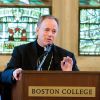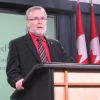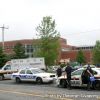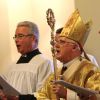OTTAWA - Motion-312 may have been shot down in the House of Commons, but Stephen Woodworth hasn’t given up.
Kateri celebrations in for long run at Ottawa school
Students at an Ottawa elementary school will be getting a full-day pass from the regular classroom in order to go to school on sainthood when Kateri Tekakwitha is canonized.
On Oct. 22, the day after Kateri is made a saint by Pope Benedict XVI in Rome, Blessed Kateri Tekakwitha Elementary School students will put away their math books and readers to spend the whole day studying St. Kateri and the process of canonization. They’ll watch videos from the Oct. 21 ceremony in Rome, hear about the school’s connection to Kateri and learn about her extraordinary life and culture from former teacher Line Douglas.
“She lived her faith and was devoted to others, caring for the elderly and the infirm while the others went about their business in the spirit of love and simplicity,” said Douglas, 70, explaining what she’ll tell the students. “She was so intense and so devoted. She was in love with the sublime, with God and did everything in such an admirable, straightforward, pure way.”
The day of learning is part of a two-month school celebration that will culminate when the school is renamed Saint Kateri Tekakwitha in late November. Similar renaming ceremonies will also occur at Blessed Kateri Catholic Elementary School in Hamilton, Ont., Blessed Kateri Tekakwitha Catholic School in Toronto and Kateri Tekakwitha Catholic Elementary School in Markham, Ont.
But the Ottawa school is taking things a step further.
“We’ve got multiple events,” said principal Paul Gautreau. “We’re using it as an opportunity for our kids to learn about Kateri and learn about what is a saint.”
The program started after the Thanksgiving long weekend when the student body, about 200 strong, were asked daily questions about Kateri, he said.
“We really want students’ voices to come through. We aren’t necessarily looking for the right answer, we want to know what they know as a starting point.”
Douglas, a descendent of the Mohawk nation, began teaching at Blessed Kateri in 1986 when the school opened. She retired in 1998. During her tenure at the school, Douglas worked hard to teach her students about Kateri’s devotion, dedication to faith despite social oppression and love of nature.
“I hoped that she rubbed off on me,” said Douglas. “I just love Kateri. I have a devotion to her.”
In the month leading up to the renaming of the school, a member of the Mohawk nation will frequent the Ottawa school to deepen the children’s knowledge of Kateri. They’ll study native culture and the challenges Kateri faced practising her faith in a 17th-century native culture.
They’ll also learn native drumming, which they will perform during the Nov. 29 renaming ceremony where traditional aboriginal refreshments and snacks will be served.
“Part of the reason for (the Nov. 29 date) is that many of people who we are going to ask to come here will actually be in Rome for the canonization,” said Gautreau.
Those who will be in Rome include Ottawa Archbishop Terrence Prendergast, a Mohawk leader and an Algonquin leader who once owned the land the school is located on.
Gautreau said he hopes the lessons continue after the school is renamed because he feels there is a lot his students can learn about their faith from Kateri.
“I hope that these celebrations will provide a little spark that will help things to just keep moving forward,” he said. “She was extremely faithful in challenging circumstances in that she renewed her faith in those challenging circumstances. That’s a message we can hopefully bring to the students.”
Miller calms conflict within pro-life movement
This article was amended on Sept. 24, 2012 to clarify comments made by Jim Hughes.
OTTAWA - A statement by Vancouver Archbishop Michael Miller that supports Catholics who campaign for “gestational legislation” to limit abortion has helped calm growing tensions within the pro-life movement.
Miller wrote it is “morally licit” for Catholics to support legislation that sets limits on abortion rather than immediately banning it outright. The archbishop’s statement, quickly endorsed by Toronto’s Cardinal Thomas Collins and posted on the Canadian Conference of Catholic Bishops’ (CCCB) web site, urges co-operation in the pro-life movement but stresses: “Co-operation does not always mean unanimity regarding a given strategy; open and civil debate about the wisdom of any specific strategy is healthy.”
Over the past year, support in pro-life circles across Canada has grown for a law that would prohibit abortion at later stages of pregnancy or gestation. Campaign Life Coalition, the national political arm of the movement, however, has remained staunchly opposed as have several other groups that believe incremental legislation of this type will not result in an eventual ban on abortion.
Each side has accused the other of not being Christian or Catholic enough — either for not protecting those babies that might be saved through some restrictions on abortion, or for not sending a strong enough message about the value of all human life from conception.
But Miller said that both positions, for or against gestational legislation, are morally licit.
Miller wrote it is acceptable to support gestational legislation (i.e. legislation that would allow abortion in the early weeks of the unborn child’s development) as an incremental step that would reduce the harms of “an unjust legal regime that permits abortion.” But such law should be regarded “as a step along the way to the eventual full legal protection of the right to life of all unborn human beings.”
“At the same time, it is also morally licit to withhold support for gestational legislation — and other incrementalist legislative strategies intended to limit access to abortion — if, after prudent reflection, one is convinced that it is an unwise legislative strategy,” he said.
The Catholic Organization for Life and Family (COLF), co-sponsored by the CCCB and the Supreme Council of the Knights of Columbus, welcomed Miller’s intervention.
“The division within the pro-life movement is very preoccupying, especially when leaders and members of pro-life groups point at each other and criticize each other’s approach to protecting the unborn,” said COLF director Michele Boulva. “All this hinders our chances of obtaining a law that would protect the most vulnerable of Canadians — its unborn citizens.”
She applauded the bishops’ taking leadership in the pro-life arena.
“As Catholics it is essential that we turn to our bishops when confusion arises regarding the Church’s teaching. Christ has empowered them to teach in His name.”
Based on Blessed John Paul II’s teachings in Evangelium Vitae, “legislation which intends to limit the harm done by a pro-abortion law is not itself co-operation with unjust law but rather ‘a legitimate and proper attempt to limit its evil aspects,’ ” the archbishop wrote.
The absence of any law restricting abortion in Canada is a “de facto legal regime that permits abortion with almost no restrictions,” the archbishop said.
“Legislation intended to restrict access to abortion would not create a new legal situation in Canada which would authorize abortions, but instead would intend to limit the number of abortions already authorized under law,” he said.
He also reiterated Catholic teaching against abortion at any stage, noting that “no law can claim to legitimize abortion.”
Two major pro-life groups on either side of the issue welcomed Miller’s statement.
Campaign Life president Jim Hughes said the archbishop makes it clear we have a de facto law by having no restrictions on abortion.
“I thought Archbishop Miller laid the case pretty well,” he said. "Although I and many others would not necessarily agree with his opinion on a de facto law.”
The most important part of his statement “points out that gestational legislation may or may not be the way to go,” said Hughes, who remains wary of the gestational legislation approach.
Priests for Life Canada is among the many pro-life groups that would support gestational legislation. Priests for Life board chairman Fr. John Lemire, a parish priest based in New Liskeard, Ont., said he is pleased the archbishop’s statement has “supported the idea that a Catholic, a Catholic politician, can in good conscience support gestational legislation.”
The archbishop’s letter may have helped shore up some of the unity within the pro-life movement that has been fragile since its inception, Hughes said. The movement is made up of political, educational and pastoral groups that counsel and support mothers with unexpected pregnancies.
“Campaign Life Coalition has been accused of being ‘all or nothing’ and that’s not true,” Lemire said, noting that since its first questionnaire in 1978, it has “always had an incremental question as part of its strategy.”
The key, said Hughes, is in the wording of any legislation.
“I’m not in favour of ‘we need any law,’ ” Hughes said.
He is opposed to the gestational approach because the experience of countries with gestational laws in place have “so many exceptions” the laws are “virtually useless.” There are many other forms of incremental legislation that would restrict abortion — such as defunding it, or informed consent laws, that Campaign Life would support, he said.
“As the political branch of the pro-life movement we have been battling over 30 years,” he said. Campaign Life has also worked closely with counterparts in other countries who have said “gestational limits are not the way to go.”
Hughes’ objection to gestational legislation extends beyond doctrinal concerns to practical matters, he said. Campaign Life has focused on identifying and supporting individual pro-life candidates in both the Conservative and Liberal parties at the grassroots level. He noted that there are presently 60 pro-life MPs in Parliament. A gestational bill would not have the votes to pass, he said. In addition, Prime Minister Steven Harper remains unwilling to reopen the abortion debate.
Hughes said momentum on the issue has been shifting towards the pro-life movement, but a focus on gestational legislation risks sidetracking it.
The role of the Priests for Life, Lemire said, is to work with all the groups, to “try to be a bridge builder and bring about some dialogue and conversations” not only among groups but with bishops and people in dioceses.
That does not mean Priests for Life agrees with every tactic, he said. But he stressed people who might not be comfortable in an activist role could be great counselling a young expectant mother, or doing any number of tasks that need to be done to create a culture of life.
MP Woodworth makes final pitch on Motion 312
OTTAWA - Conservative MP Stephen Woodworth told journalists Sept. 17 his Motion 312 is not about abortion but whether Canada has lost its consensus on inalienable human rights and honest laws.
Woodworth admitted his private member’s motion has little chance of passing when it comes to a final vote Sept. 26 because the Prime Minister and chief government whip are on record that they will not support it because of promises they’ve made not to reopen the abortion debate.
On the opening day of the fall session of Parliament, Woodworth said Motion 312 “has much more important consequences than the abortion issue.” At stake is whether Canada has lost a consensus that the dignity and worth of every human being must be recognized, that rights are inalienable rather than granted by the government, that rights cannot be taken away through laws that deny basic human rights to a class of people by dehumanizing them and that laws must be honest, he said.
Motion 312 would strike a parliamentary committee to examine the 400-year-old definition of a human being in the Criminal Code’s homicide section concerning unborn children. For the purposes of the law, an unborn child is not a person with human rights until he or she leaves the birth canal. The committee would investigate whether this definition holds up in light of scientific evidence.
His motion specifically states the findings of the committee could not go against any Supreme Court of Canada decisions or the Constitution when it comes to women’s rights, he said.
Supreme Court Justice Bertha Wilson, who wrote the Morgentaler decision, was concerned about the rights of the unborn in later stages of pregnancy and left it open for Parliament to craft a law protecting them, and the courts have not closed the issue, he stressed.
Woodworth explained the motion, if passed, could undertake an investigation that may or may not settle the issue of when an unborn child is a human being.
“Even settling the issue of when a child should be a human being will not settle the issue of abortion,” he said.
Woodworth said one of the options of the committee could be to decide an unborn child is not a human being. His motion, however, is about universal human rights and he hoped the second hour of debate Sept. 21 would bring out that aspect.
Woodworth said he has been accused of “wanting to back to the Middle Ages,” or of opening issues that were settled by the courts. Opponents never talk about what his motion actually says, Woodworth said. No one has disagreed with the suggestion that unborn children might be human beings before birth.
“The first distraction is to talk about me, my character, my motives,” he said.
Tens of thousands of people have written their MPs in support of the motion, he said. And on Sept. 18, about 60 mainly religious and pro-life groups signed and sent a declaration in support of the motion to MPs. Among the 60 groups to sign “The Declaration of Support for Parliamentary Study of Canada’s Legal Definition of ‘Human Being’ ” were the Catholic Organization for Life and Family, the Knights of Columbus, REAL Women Canada, the Evangelical Fellowship of Canada and various evangelical churches.
After the news conference, journalists scrummed NDP Justice Critic Francoise Boivin who said the debate on abortion is closed. She pointed out Prime Minister Stephen Harper has taken the same view and Canadians have reached a consensus. The legal definition of a human being sees the pregnant woman as one person, not two, for the purposes of the law.
Surveys have consistently shown about two-thirds of Canadians would like some law restricting abortion.
Gambling Ottawa priest's court appearance put off to Oct. 17
OTTAWA - Fr. Joe LeClair, a popular Ottawa priest who has been charged with theft, fraud and breach of trust, had his first court appearance postponed until Oct. 17 after one of his lawyers asked for more time to examine the evidence.
Defense counsel had only received disclosure of evidence in the previous week and also wished for pre-trial consultations with the crown, the lawyer told the court on Sept. 5. LeClair was not present.
LeClair was charged July 3 with one count each of theft, fraud, criminal breach of trust and laundering the proceeds of crime after a lengthy Ottawa Police Organized Fraud investigation that was launched more than a year ago following a complaint from the archdiocese of Ottawa about missing funds from Ottawa's Blessed Sacrament parish.
Over a review period from January 2006 to May 2011, police found $240,000 in parish cheques were misappropriated and $160,000 in cash that was not accounted for.
LeClair, who has served in the Ottawa archdiocese for 25 years, was largely credited with the revival of Blessed Sacrament parish in the Glebe neighbourhood. In the spring of 2011, he admitted to a gambling addiction after the Ottawa Citizen ran a series of articles revealing huge credit card debts and cash advances. The priest denied ever misusing parish funds to feed his gambling habit.
The archdiocese of Ottawa asked for a forensic audit around the same time the newspaper began its reports. After the audit was completed, the archdiocese filed the complaint.
Ottawa Catholic board fined for explosion that killed student
OTTAWA - The Ottawa Catholic District School Board has been fined $275,000 for its role in a 2011 classroom explosion that killed student Eric Leighton.
“As a school board ultimately we’re responsible for what happens in the schools,” said Julian Hanlon, director of education. “We’ve accepted that responsibility all along and this process will hopefully help bring some closure to the case, in particular for the Leighton family themselves.”
When Leighton tried cutting a 55-gallon drum in half with an angle grinder during his morning shop-class on May 26, 2011, the steel barrel exploded. The blast sent five students and A teacher to hospital, all of whom left with minor injuries except for Leighton. The Grade 12 student later passed away. He was 18.
Charged in January under the Occupational Health and Safety Act with failing to provide instruction or supervision, failing to take every reasonable precaution to protect the workplace and failing to properly acquaint a supervisor with the handling of equipment, the board faced up to $500,000 in fines.
A media release from the Ministry of Labour stated that “the barrel the student was using had been washed out with flammable cleaner ... the barrel had been stored with its caps closed prior to the class project, allowing flammable cleaning vapour to accumulate.”
The family has called for a coroner’s inquest which is still being considered according to Dr. Roger Skinner, regional supervising coroner for Ontario east.
Rejoice in the day the Lord has made
OTTAWA - “I have never been in a church this big,” said one soon-to-be ex-Anglican priest to Archbishop Terrence Prendergast of Ottawa in the sacristy of St. Patrick’s Basilica on Divine Mercy Sunday.
The occasion was a solemn Mass in the “Anglican Use” to receive some 40 members of the Anglican Catholic Church of Canada into full communion with the Catholic Church. The several dozen new Catholics will form a quasi-parish that, while fully Catholic, will celebrate the Eucharist according to approved liturgical books which draw upon their Anglican heritage.
Finding meaning behind the idea of covenants
A few weeks ago, I was shanghaied by one of my friends into attending a Bible study with Ottawa Christian Fellowship.
I must admit I was not particularly optimistic about this venture, given the brutal Ottawa winter in full swing at the time. Also, as a product of numerous retreats and Catholic conferences during high school, I was equally doubtful that I would learn anything new. So with a degree of scepticism, I followed my friend and her Bible study group into one of the major residences on the University of Ottawa campus.









